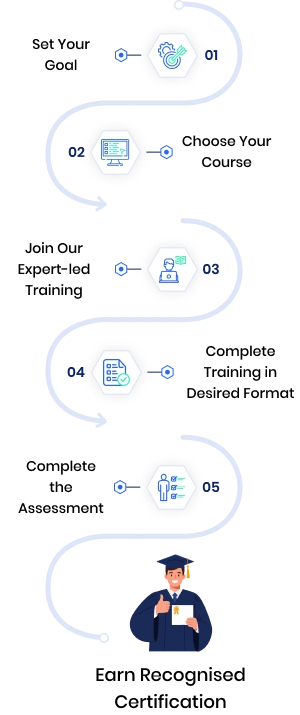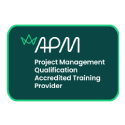Course Overview O v e r v i e w
- Course Overview
- Course Outline
- What’s Included
- What You’ll Learn
- Exam Details
APM PMQ Overview
The APM Project Management Qualification (PMQ) is a globally recognised certification developed by the Association for Project Management. It provides a broad understanding of project management principles, covering key topics such as risk, governance, planning, and leadership. Suitable for professionals across industries, PMQ equips learners with the knowledge and confidence to manage projects effectively from initiation to completion.
Being formally trained in APM PMQ offers significant advantages, including enhanced career prospects, improved project delivery skills, and alignment with industry best practices. It helps professionals gain a structured approach to managing projects, ensuring consistency, efficiency, and stakeholder satisfaction. Formal training also prepares candidates thoroughly for the PMQ exam, increasing their chances of success.
Training Deals stands out by offering expertly designed APM PMQ courses that combine interactive learning with practical insights. Our training is delivered by experienced tutors who bring real-world project management expertise into the classroom. With flexible learning options, comprehensive study materials, and dedicated support, Training Deals ensures every learner is well-prepared to achieve their PMQ certification with confidence.

APM PMQ Outline
Module 1: Life Cycles
- Understand Distinct Life Cycle Stages Used to Structure Projects
- Differences Between a Project Life Cycle and an Extended Life Cycle
- Influence of Organisational Context and Culture, and Specific Project Needs on Life Cycle Choice and Adaptations
- Strengths and Limitations of Different Life Cycles
Module 2: Governance Arrangements
- Understand Governance Structures Aligning with Organisational Practice(Different Types of Organisation Structures and Their Feature)
- Roles Within Project Management and Responsibilities of Each Role
- Importance of Project Management Governance Aspects
- Impact of a Project’s Life Cycle on Its Governance Framework and Financial Authority Limits
- Linking Projects to an Organisation’s Objectives
Module 3: Sustainability
- Sustainability Responsibilities, Principles, Priorities, and Their Impact on Projects
- Monitoring and Reporting on Sustainability Measures
Module 4: Business Case
- Tools and Techniques Influencing a Project’s Business Case
- Importance of Reviewing Changes Impacting the Business Case
- Business Case as the Project Baseline
Module 5: Procurement
- Importance and Purpose of a Procurement Strategy
- Stages of Supplier Selection and Procurement Planning
- Features of Different Contractual Relationships
- Methods of Supplier Reimbursement and Their Applicability
Module 6: Reviews
- Benefits of Conducting Reviews Throughout the Life Cycle
- Factors Typically Reported to Ensure Successful Outcomes
- Importance of Producing Information for Decision-making
- Re-planning Activities Post-review
Module 7: Assurance
- Purpose of Assurance and Awareness of Its Scope, Priorities, and Strategic Aims
Module 8: Transition Management
- Requirements for a Successful Transition
- Importance of Knowledge Transfer and Continuous Improvement
- Engaging Stakeholders in Transition Planning
Module 9: Benefits Management
- Monitoring Benefit Realisation Throughout a Project
- Meaning, Importance, and Communication of Benefits Management
Module 10: Stakeholder Engagement and Communication Management
- Working with Internal and External Parties to Achieve Project Outcomes
- Relationships Between Stakeholder Analysis, Influence, and Engagement
- Benefits of a Communication Plan and Managing Stakeholder Expectations
- Range of Communication Methods and Tailoring Messaging
Module 11: Conflict Resolution
- Identifying and Addressing Differences Within a Project
- Sources and Impacts of Conflict
- Approaches to Address Conflict in Various Situations
Module 12: Leadership
- Impact of Leadership on Team Performance
- Necessity of Varied Leadership Styles
- Importance of a Coaching and Mentoring Style
Module 13: Team Management
- Stages of Team Development and Influencing Factors
- Models Used for Understanding Team Development
- Characteristics and Benefits of Effective Teams
- Leadership Approaches for Virtual and Hybrid Teams
Module 14: Diversity and Inclusion
- Building an Inclusive Environment Embracing Diverse Culture
- Knowledge of Diversity and Its Workplace Impacts
- Importance of Incorporating Diversity in All Project Parts
- Addressing Conscious and Unconscious Biases
Module 15: Ethics, Compliance and Professionalism
- Importance of Continuing Professional Development
- Specialist Advice and Standards for Project Adherence
- Impact of the Legal and Regulatory Landscape on Projects
Module 16: Requirements Management
- Capturing and Monitoring Project Requirements
- Establishing and Managing Scope Through Requirements Management Processes
Module 17: Solutions Development
- Evaluating and Prioritising Requirements
- Different Approaches for Different Life Cycle Models
Module 18: Quality Management
- Ensuring Outputs Meet Set Requirements
- Quality Planning and Control Techniques
Module 19: Integrated Planning
- Incorporating Multiple Plans into a Project Management Plan
- Importance of an Integrated Schedule Management Plan
Module 20: Schedule Management
- Time-based Planning Focusing on Activities and Resources
- Defining Scope, Managing Dependencies, and Optimising Schedules
Module 21: Resource Management
- Identifying and Scheduling Required Resources
- Organisational Breakdown Structure and Responsibility Assignment
- Resource Categorisation and Allocation
- Differences Between Resource Smoothing and Resource Levelling
Module 22: Budgeting and Cost Control
- Estimating Costs, Agreeing Budgets, and Monitoring Finances
- Budget Creation and Refinement
- Financial Performance Monitoring and Reporting
- How to Close Down Finances at the End of a Project?
Module 23: Risk and Issue Management
- Identifying Risks and Planning Responses
- Benefits of Risk and Contingency Planning
- Stages of Risk and Issue Management Processes
- Why Governance is Important in Risk and Issue Management?
Module 24: Change Control
- Stages of Change Control Processes
- Recognise Differences in Change Control Between Linear and Iterative Cycles
- Assessing and Justifying Changes
- Justify Decisions on Change Requests
- Update Plans and Schedules to Reflect Changes

What’s included in this APM PMQ?
- Expert-led Training Sessions by Certified Instructors
- APM Project Management Qualification (PMQ) Exam
- Digital Delegate Pack
What You’ll Learn in this Course
This course takes you from understanding core principles to applying advanced project management practices. Each module builds your confidence and capability to lead successful projects across industries.
- Learn core principles from APM’s Body of Knowledge framework
- Learn to define roles, responsibilities, and governance structures clearly
- Learn to manage risks, issues, and change effectively
- Learn structured planning techniques for diverse project environments
- Learn to monitor progress using control and reporting methods
- Learn to align outcomes with strategic business goals successfully

APM Project Management Qualification (PMQ) Exam Information
The APM PMQ exam evaluates your understanding of key project management principles and practices. It focuses on the APM Body of Knowledge, covering essential topics such as governance, risk, planning, and leadership. The details below outline the current exam structure and format.
- Type of Questions:
- Multiple response (20 questions worth 1 mark each)
- Select from list (5 questions worth 2 marks each)
- Short response (5 questions worth 2 marks each)
- Long response (10 questions worth 5 marks each)
- Total Questions: 40
- Total Marks: 90 Marks
- Pass Marks: 55%, or 50/90 Marks
- Duration: 2 hours and 30 minutes (There is an optional break of up to 30 minutes between the two parts of the exam)
- Type: Closed book

Our Upcoming Batches
Mon 23 Mar 2026 - Fri 27 Mar 2026
Duration: 5 Days
Mon 30 Mar 2026 - Fri 3 Apr 2026
Duration: 5 Days
Tue 7 Apr 2026 - Sat 11 Apr 2026
Duration: 5 Days
Mon 13 Apr 2026 - Fri 17 Apr 2026
Duration: 5 Days
Mon 7 Sep 2026 - Fri 11 Sep 2026
Duration: 5 Days Buxton
Mon 28 Dec 2026 - Fri 1 Jan 2027
Duration: 5 Days Buxton
Mon 6 Apr 2026 - Fri 10 Apr 2026
Duration: 5 Days Corby
Mon 13 Apr 2026 - Fri 17 Apr 2026
Duration: 5 Days Corby
Request More Information

Corporate Training
Elevate your workforce with expert-led corporate training that enhances skills, boosts productivity, and aligns teams with your business goals.

Individuals Training
Unlock personal growth and sharpen professional skills with tailored training designed to build your confidence and career success.
Your Path to Professional Recognition
Our path is designed to guide you through each stage with clarity, support and practical learning, helping you achieve your goals with confidence.

Step Forward with Globally Recognised Certification
A recognised certification is more than a credential. It’s proof of your commitment to professional excellence, providing you with the credibility, confidence, and global reach to advance your career in exciting new directions.
Globally Certified Professionals Over Time
Career Growth
81%Certified professionals reported receiving a promotion after earning their certification.
Global Opportunities
89%Certified professionals experienced access to new career opportunities, including leadership roles and global positions.
Not able to find what you are looking for
Our experts will guide you to the right course from thousands worldwide: tailored to your goals.
Frequently Asked Questions
The APM PMQ is a globally recognised qualification that demonstrates a broad understanding of project management principles.
There are no formal prerequisites, but a basic understanding of project management is beneficial.
The APM PMQ is a comprehensive qualification, but with the right preparation and structured training, many candidates find it achievable. It’s designed to test practical understanding, so engaging with the course content and applying real-world thinking can significantly boost your success.
No, the exam is closed book, meaning no reference materials are allowed during the assessment.
The course covers governance, planning, risk, leadership, communication, and stakeholder management, based on the APM Body of Knowledge.
What Our Customers Say About Us
 Matthew Sullivan
HR Business Partner
Matthew Sullivan
HR Business Partner
Our HR team registered for the Change Management Foundation & Practitioner Training Course, and it couldn’t have been more valuable. The team gained practical frameworks to guide employees smoothly through transitions with confidence.
 Olivia Barrett
Operations Manager
Olivia Barrett
Operations Manager
Our operations staff completed the Lean Six Sigma Green Belt Training Course, and it has been transformative. We can now identify inefficiencies quickly, and the tools we learned are already improving performance across the team.
 Benjamin Foster
Product Manager
Benjamin Foster
Product Manager
Our product team took part in the Agile Project Management Foundation & Practitioner (AgilePM®) Training Course, and the difference is remarkable. We’re now more adaptive, collaborative, and efficient in managing change.
 Lucy Harper
IT Support Lead
Lucy Harper
IT Support Lead
Our IT support unit attended the ITIL® 4 Foundation Training Course, and the results have been impressive. Processes are smoother, collaboration has improved, and the team finally speaks a common language of service management.
 Edward Clarke
Programme Manager
Edward Clarke
Programme Manager
We joined the PMP® Certification Training Course as a leadership group, and it was outstanding. The trainer made every concept practical, and the exam preparation resources helped the whole team feel ready to tackle complex projects.
 Amelia Rhodes
Project Officer
Amelia Rhodes
Project Officer
Our project office completed the PRINCE2® Foundation & Practitioner Training Course, and it has brought real clarity to how we manage projects. The trainer’s examples were excellent, and the team now follows a structured approach with confidence.

























